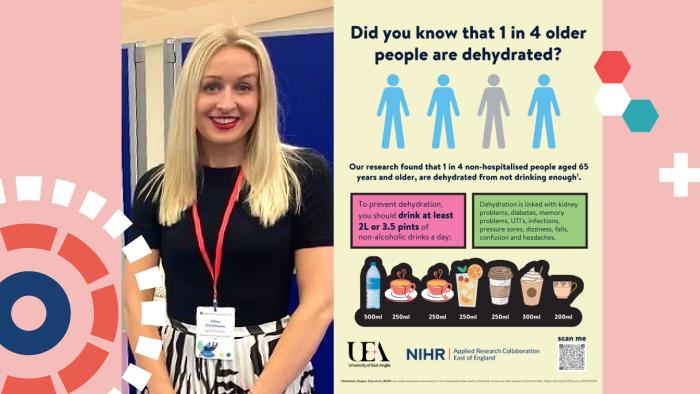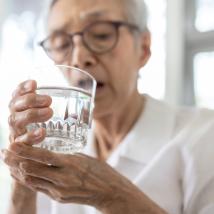ARC EoE researcher Ellice Parkinson shares her journey into research and explains her PhD project, which aims to improve hydration for older people across health and social care settings in Norfolk and Waveney.

I am a fourth year PhD researcher based at the University of East Anglia (UEA) and my PhD is part-funded by ARC East of England (ARC EoE), working with the inclusive involvement theme and the food and nutrition subgroup from the prevention and early detection theme. Before starting my PhD, I was a research fellow in the NHS focusing on Huntington’s Disease. Whilst progressing a clinical psychology career, I fell into doing research to gain experience for a clinical psychology doctorate application.
I ended up enjoying my research role so much that I continued a research career!
I spotted a PhD opportunity during maternity leave and was ready for a new challenge which also overlapped with my current role. I’m grateful to ARC EoE for co-funding my PhD and supporting me to undertake research into dehydration in older people living with dementia.
Dehydration is a really serious problem for older people, and a preventable one. A lot of older people are not aware that they need to drink more as they age, because their bodies are more susceptible to fluid loss.
Ellice Parkinson, ARC East of England researcher
Dehydration is also linked to many other health problems for older people, such as headaches, diabetes, kidney problems, cognitive problems, infections, pneumonia, pressure sores and constipation. Research has found that dehydrated older people are more likely to be hospitalised, and more likely to die if they are dehydrated on admission to hospital.
We recently published findings from a systematic review in Clinical Nutrition showing that one in four people over 65 are dehydrated, from not drinking enough. It’s really important to encourage people to drink enough to stay well hydrated and healthy (about two litres a day, or 3.5 pints) and adopt healthier lifestyle habits.
I successfully applied for some impact funding from UEA to disseminate these research findings in a poster for health and social care settings across Norfolk and Waveney. The posters needed to be simple, clear and evidence-based, highlighting the importance of hydration, and providing up-to-date guidance on how much people should drink daily.
The posters were a great project for community collaboration and involvement and I invited a wonderful group of older people, carers and health professionals across England to an online workshop to help develop some prototype designs. The group were honest and helpful, contributing to every aspect of the poster including the wording, design, visual appeal and colours.
I then sought further feedback on the revised posters from the workshop attendees via email, as well as further input from health professionals and carers, to see if they would find the posters useful to support an older person. After many tweaks and revisions, we received the final proofs from the designers and everyone was really happy with them! Thousands of posters were then packaged and posted to nearly 400 nursing homes, care homes, GP surgeries and hospitals across Norfolk and Waveney.
I’ve received some lovely emails from care homes thanking me for the posters they received. I also love poster spotting across Norfolk and recently saw one up in my local GP surgery! In response to an advert in the Norfolk and Suffolk Care bulletin, one care home fed back that they were an “Excellent quick look reminder to staff” ensuring that “Staff are reminded the importance of hydration with the residents” highlighting the impact of the posters.
It would be great if the posters had an impact further afield outside of Norfolk and Waveney, and I have contacted the Department for Health and Social Care Campaign Resource Centre to see if we can get digital versions displayed at NHS sites across the UK. It would also be helpful if third sector and voluntary organisations can display the posters on their websites, to raise awareness of dehydration risks to older people and put this issue on everyone’s radar.
Earlier this year, the UEA Hydrate Group collaborated on a project with AGE UK Norwich adapting the UEA’s evidence-based DrinKit resources for older people living in their own homes. The DrinKit was originally developed for care homes in collaboration with care home staff. We are also recently completed a small project which evaluated and improved the DrinKit and updated the website, working with people who have downloaded and used these resources. The UEA Hydrate Group also has links with a care home group in Brazil and they have translated the DrinKit into Portuguese and Brazilian. Hopefully the dehydration posters will be included too!
With a project like this, it’s really important for all parties to have a clear understanding of what is involved, what everyone’s responsibilities will be, and how much time this might require. Care home staff are incredibly busy and researchers must appreciate and respect this, but also be flexible and accommodating to enable care homes to be involved with relevant research studies.
Ellice Parkinson, ARC East of England researcher
I would like to thank my PhD supervisors: Dr Lee Hooper, Professor Fiona Poland and Dr Diane Bunn at UEA, for always supporting and encouraging me throughout my PhD journey. I’m also grateful for all the support from ARC EoE colleagues, and everyone sharing these dehydration awareness posters within their own networks to help more people see them.
Further information and resources
- Read the ENRICH blog about Ellice’s PhD D-DRINC study with ARC EoE
- Read the Care Homes Research blog about the review findings that 1 in 4 non hospitalised older people are dehydrated
- Access the full systematic review published in Clinical Nutrition Journal
- Listen to a NIHR Dementia Researcher podcast about dehydration
